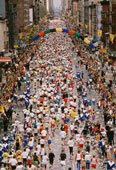Guy forwarded this great article to me last week. I think there is something about it we can all relate to. No matter what level you are, there is a simplistic joy and pain to be found in the one sport that is man against himself. Running.
RUNNING FOR LEAN TIMES–It’s no accident that jogging took off in the 1970s.
 It’s nearly summertime, but the living isn’t easy — not if you’re suffering from a 401(k) meltdown. Life, in fact, is hard, and only getting harder. And when life gets tough, the tough get running.
It’s nearly summertime, but the living isn’t easy — not if you’re suffering from a 401(k) meltdown. Life, in fact, is hard, and only getting harder. And when life gets tough, the tough get running.While gym memberships are down and personal trainers are getting the boot, running is making a major comeback according to race directors and shoe retailers.It’s easy to see why. Running is an inexpensive activity that requires little in the way of equipment — a decent pair of shoes, shorts, socks and a T-shirt and you’re ready. The playing field is any free land, sidewalk, park or road. (It’s not surprising that America’s first running craze was born of the economic malaise of the 1970s.) And most cities and towns have at least one running club, an informal group that meets for distance runs and interval workouts. In short, running is one of the cheapest forms of exercise a body can do.
But running is not just exercise. It’s a great stress reliever and an inexpensive source of neurotransmitters like dopamine that wash the body with good feelings. In stressful times, running can literally make us happy. Thus, being a runner is both an emotional and biochemical commitment.
Of course, some people “jog” purely for fitness purposes and hate it. This might explain why the French were recently in an uproar after photos surfaced of President Nicolas Sarkozy in shorts and a T-shirt breaking a sweat in the Tuileries. Running is an American activity, the French press claimed, a fascistic act designed to manage and control the body. Not an intellectual pursuit at all. “It is about performance and individualism,” one writer wrote, right-wing values antithetical to everything cherished by the country that gave us foie gras.Perhaps so. Yet once infected by the running bug, it’s hard to find a cure.
During the winter in New York I would routinely encounter a man who ran the loop of Central Park shirtless, no matter the weather. I once saw him in the middle of a 22-inch snowstorm when I thought I’d be the only one crazy enough to venture outside. Yet the park was filled with runners.
Another time my training partner burst into tears in the middle of a run because his girlfriend had just dumped him. Rather than stopping, he picked up the pace, until the two of us were flying down the mall in Washington, D.C., in the middle of a blistering hot day, silent and relentless, burning away the sorrow.All runners have stories, many of them bizarre or off-color. In law school I ran with a world-class, 5,000 meter runner who disclosed he was stoned in the middle of a 13-mile run (apparently a common training technique for him). At the Olympic trials in Charlotte, N.C., in 1996, marathoner Bob Kempainen vomited a bright green stream of Gatorade on national television, then calmly accelerated (running a 4:44 mile) and sprinted to victory. World record-holder Grete Waitz did her business on the side of the road, then pulled up her shorts and went on to win the 1984 New York City Marathon.
 Every runner has a tale about a port-a-potty just missed, a coffee that wouldn’t stay down, a blister that burst and filled a sock with blood. We tell the stories with pride, metaphors for our own indomitability.None of us, of course, can beat back disease, debilitation or death. Yet imagine the runner, alone on the road, his footfalls on gravel in sync with his breathing. He is swift and fast and focused. His arms pump in steady cadence. His knees rise in regular rhythm. There is nothing on his mind but how his fingers feel as they brush his palm, his toes as they kiss the edge of his shoes, his calves as they whisper against each other with every stride. He is man, machine, spirit. Watch him fly.
Every runner has a tale about a port-a-potty just missed, a coffee that wouldn’t stay down, a blister that burst and filled a sock with blood. We tell the stories with pride, metaphors for our own indomitability.None of us, of course, can beat back disease, debilitation or death. Yet imagine the runner, alone on the road, his footfalls on gravel in sync with his breathing. He is swift and fast and focused. His arms pump in steady cadence. His knees rise in regular rhythm. There is nothing on his mind but how his fingers feel as they brush his palm, his toes as they kiss the edge of his shoes, his calves as they whisper against each other with every stride. He is man, machine, spirit. Watch him fly.Mr. Stracher is publisher of the New York Law School Law Review. He is writing a book about the 1970s and the running boom.
